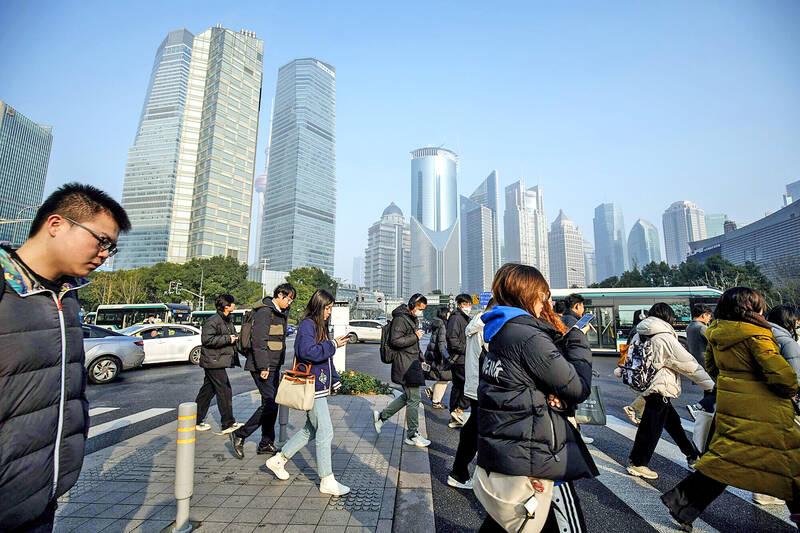The exposure of the local financial industry to China fell 11.96 percent from a year earlier to NT$1.05 trillion (US$33.61 billion) at the end of last year amid concerns over the slowing Chinese economy, data compiled by the Financial Supervisory Commission on Thursday showed.
Within the industry, Taiwanese banks’ exposure to China fell below NT$1 trillion to NT$961.0 billion, down 10.66 percent from a year earlier, the commission’s data showed.
The data indicated that exposure accounted for 22.7 percent of the industry’s net worth, the lowest level in the 42 quarters since the commission started tallying such exposure to China in the third quarter of 2013.

Photo: Bloomberg
Local banks’ exposure to China — including lending, investments and interbank loans and deposits — moved lower as worries over China’s economic outlook prompted Taiwanese banks to scale back their funding to the Chinese market, Banking Bureau Deputy Director-General Roger Lin (林志吉) said.
The IMF forecast on Friday that China’s economic growth would slow to 4.6 percent this year, down from 5.2 percent growth last year, and further moderate in the medium term, with growth of about 3.5 percent estimated for 2028.
Many Taiwanese financial firms have turned cautious about the spiraling financial crisis in the Chinese property market, where debt-ridden property giant China Evergrande Group (恆大集團) has been ordered to liquidate by a court, Lin said.
Last year, Taiwanese banks’ lending to investments in China totaled NT$244.44 billion, down 7.51 percent from a year earlier, and lending to China also fell 14.53 percent from a year earlier to NT$640.28 billion.
Bucking the downturn, the local banks’ interbank loans to Chinese counterparts and bank deposits rose 22.42 percent from a year earlier to NT$76.29 billion.
Meanwhile, local insurance companies’ investments in marketable securities in China fell 25.29 percent from a year earlier to NT$77.4 billion at the end of last year, accounting for only 0.24 percent of the sector’s total disposable funds, the commission said.
The investments in Chinese securities were all made by Taiwanese life insurers, while property and casualty insurers owned no securities in China, it said.
Last year, Taiwanese securities and futures brokerages cut their exposure to China by 10.28 percent to NT$12.94 billion, with securities firms’ exposure falling 12.91 percent to NT$9.998 billion while that of futures companies was the same as the previous year at NT$251 million, the commission said.
The commission said the decline in exposure among securities firms largely reflects financial investment strategy adjustments.

The number of Taiwanese working in the US rose to a record high of 137,000 last year, driven largely by Taiwan Semiconductor Manufacturing Co’s (TSMC, 台積電) rapid overseas expansion, according to government data released yesterday. A total of 666,000 Taiwanese nationals were employed abroad last year, an increase of 45,000 from 2023 and the highest level since the COVID-19 pandemic, data from the Directorate-General of Budget, Accounting and Statistics (DGBAS) showed. Overseas employment had steadily increased between 2009 and 2019, peaking at 739,000, before plunging to 319,000 in 2021 amid US-China trade tensions, global supply chain shifts, reshoring by Taiwanese companies and

Taiwan Semiconductor Manufacturing Co (TSMC, 台積電) received about NT$147 billion (US$4.71 billion) in subsidies from the US, Japanese, German and Chinese governments over the past two years for its global expansion. Financial data compiled by the world’s largest contract chipmaker showed the company secured NT$4.77 billion in subsidies from the governments in the third quarter, bringing the total for the first three quarters of the year to about NT$71.9 billion. Along with the NT$75.16 billion in financial aid TSMC received last year, the chipmaker obtained NT$147 billion in subsidies in almost two years, the data showed. The subsidies received by its subsidiaries —

Shiina Ito has had fewer Chinese customers at her Tokyo jewelry shop since Beijing issued a travel warning in the wake of a diplomatic spat, but she said she was not concerned. A souring of Tokyo-Beijing relations this month, following remarks by Japanese Prime Minister Sanae Takaichi about Taiwan, has fueled concerns about the impact on the ritzy boutiques, noodle joints and hotels where holidaymakers spend their cash. However, businesses in Tokyo largely shrugged off any anxiety. “Since there are fewer Chinese customers, it’s become a bit easier for Japanese shoppers to visit, so our sales haven’t really dropped,” Ito

OUTLOOK: Pat Gelsinger said he did not expect the heavy AI infrastructure investments by the major cloud service providers to cause an AI bubble to burst soon Building a resilient energy supply chain is crucial for Taiwan to develop artificial intelligence (AI) technology and grow its economy, former Intel Corp chief executive officer Pat Gelsinger said yesterday. Gelsinger, now a general partner at the US venture capital firm Playground Global LLC, was asked at a news conference in Taipei about his views on Taiwan’s hardware development and growing concern over an AI bubble. “Today, the greatest issue in Taiwan isn’t even in the software or in architecture. It is energy,” Gelsinger said. “You are not in the position to have a resilient energy supply chain, and that,